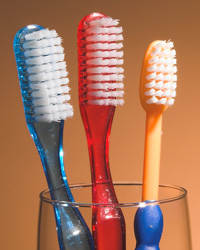Plaque Control Toothpastes: Good Preventative Dentistry?
The marketers of toothpastes have come up with a new spin that will work on your teeth – toothpaste that helps prevent plaque. Since most American consumers are now aware of oral hygiene and the threat of gum disease, toothpaste manufacturers and marketers have spent upwards of $77 million to sell anti-plaque and tarter control home care products. The media blitz in the dentistry world is on.
Dentists have always known that plaque is the cause of gum disease. And plaque will eventually contribute to the formation of tarter on your tooth. But if you use these new toothpastes, will they work.
Crest and Colgate and other major brands have added a substance that seems to slow the accumulation of tartar on the tooth. You can try it and see for yourself if it works.
But the bottom line for many dentists would be to make sure you're brushing right, no matter what toothpaste you use. A new group of bacteria forms on a tooth every 24 hours, so the object of brushing is to disrupt these colonies. Dental hygiene includes: good tooth brushing techniques, a learned skill that takes practice. However, even the most determined brushing won't always get rid of debris beneath the teeth.
That's why an annual dental cleaning and refresher course on brushing and flossing should bring you up-to-date on the oral health front. And what about those new toothpastes? Can't hurt. Call your dentist today.

+Jim Du Molin is a leading Internet search expert helping individuals and families connect with the right dentist in their area. Visit his author page.
Learn About Tooth Abrasion and Overbrushing from Your Dental Hygienist
The issue of over brushing and its direct link to tooth abrasion has been a topic in many journal and news articles. A story in The Wall Street Journal (February 4, 2000) stated that in many cases, "the culprit in tooth abrasion is the toothbrush itself."
This issue is particularly important to because people can damage healthy teeth and gums by brushing too hard, oftentimes with a medium- or hard-bristled toothbrush. In fact, dentists and dental hygienists have a recommendation on how to brush your teeth they recommend that you use a soft-bristled toothbrush for your dental cleaning.
Your teeth and gums are susceptible to wear and tear like all other parts of your body. In cases of improper dental hygiene and brushing, such as brushing too vigorously, gum tissue can be worn away. Receding gums then lead to other significant dental problems such as sensitive teeth, periodontal disease, cavities, root canals, and, potential loss of teeth.
Your dental hygienist will explain that brushing your teeth correctly includes adjusting the angle of your toothbrush (it should be at a 45-degree angle), lessening the amount of pressure you use, monitoring the length of time, as well as making sure that you are using a soft-bristled toothbrush. In addition, always ask your dentist for specific recommendations related to your dental hygiene care and healthy teeth.
While the potential harm to healthy teeth and gums through poor dental hygiene and over brushing is significant, an even greater percentage of the population suffers damage to their teeth from occlusion (bad bite), genetic factors, and poor overall dental cleaning. It is critical to carefully maintain and monitor your oral health.
The best approach to maintaining good oral hygiene is to brush your teeth twice a day with a soft-bristled toothbrush with fluoride toothpaste, floss or clean between the teeth using an inter-dental cleaner (special brushes, picks or sticks), and visit your dentist every six months. Follow your dental hygienist's advice with regard to any changes to this regimen.
By Brian J. Gray, DDS, MAGD, FICO

+Jim Du Molin is a leading Internet search expert helping individuals and families connect with the right dentist in their area. Visit his author page.










